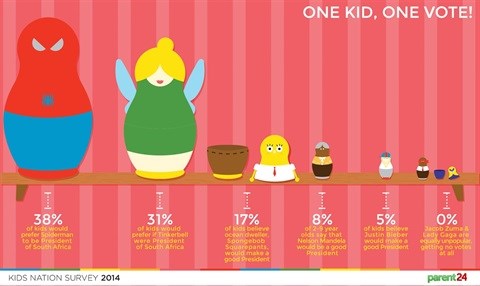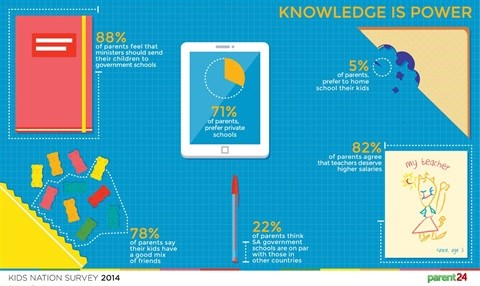The first Parent24 Kid's Nation Survey has released results on children and parents' behaviour across South Africa, including issues of food, entertainment, the future, discipline, school/care, money and elections.
The online survey reflects the views of approximately 2700 parents and their kids, from all nine provinces. "We decided to run the annual Kid's Nation Survey to establish how parents and their children are behaving," says Scott Dunlop, editor of Parent24.
Food, technology
It turns out that broccoli is South Africa's most hated vegetable and that 62% of kids eat takeaways up to three times a week. "When it comes to feeding your child vegetables, presentation and variety may be the key. The greater the variety of nutritious choices presented to a child, the more likely the child will choose adequately. Children eating more takeaways on such a regular basis is a big concern, as it has been shown that eating fast-food meals more than once a week is a major contributing factor of childhood obesity," says Cara van Heyningen, nutritional therapist and health coach.
Twenty-three percent of South African kids have their own cellphone or tablet. "One of the biggest problems about having ready access to technology is that children are not developing their memory capacity. Even something simple, such as most kids no longer need to remember things such as telephone numbers has weakened their short-term memory skills. This translates to serious difficulties with reading and mathematics," says Catherine Radloff, educational psychologist. "It needs to be noted that technology is not all bad and can actually benefit children on a social and educational level. However, responsible use is key."
Education, discipline
Most parents (97%) think that their children will attend a tertiary institution. This is positive, but does not necessarily correlate with the reality of South African tertiary education. According to the Department Of Higher Education, only 15% of university students graduate. In 2013, the Matric pass rate was 78.2%, but only 30% received university exemption.
Seventy-eight percent of parents do not think that South African government schools are on par internationally. This correlates with the World Economic Forum report 2014 that ranked South Africa last (148th) for maths and science, and 53rd overall internationally.
Most parents (41%) feel that reasoning is the best discipline, while 30% opt for a smack on the bum. "The fact that 30% of parents still think that smacking a child is an acceptable way to discipline children is a very distressing statistic. It can be tempting to think that a smack sorts out disobedience or bad behaviour in a child. However, numerous studies have found that physical punishment increases the risk of broad and enduring negative developmental outcomes. Smacking a child sets a bad example of how to handle strong emotions. It may also encourage children to lie or hide their feelings to avoid being smacked and can lead to a resentful and angry child," comments Radloff.
Chores are good
The survey found that most kids (75%) help with chores around the house. According to Radloff, "There are many developmental advantages to giving children chores to do around the house. Chores teach children how to become responsible adults, as it requires them to make decisions, stick to a routine, delay gratification and deal with frustration. Doing chores also enhances children's self-esteem as they get a sense of accomplishment from doing something well. It also increases their independence as they gradually learn how to do basic things for themselves."
To view the infographics and videos, go to www.parent24.com/survey.

































